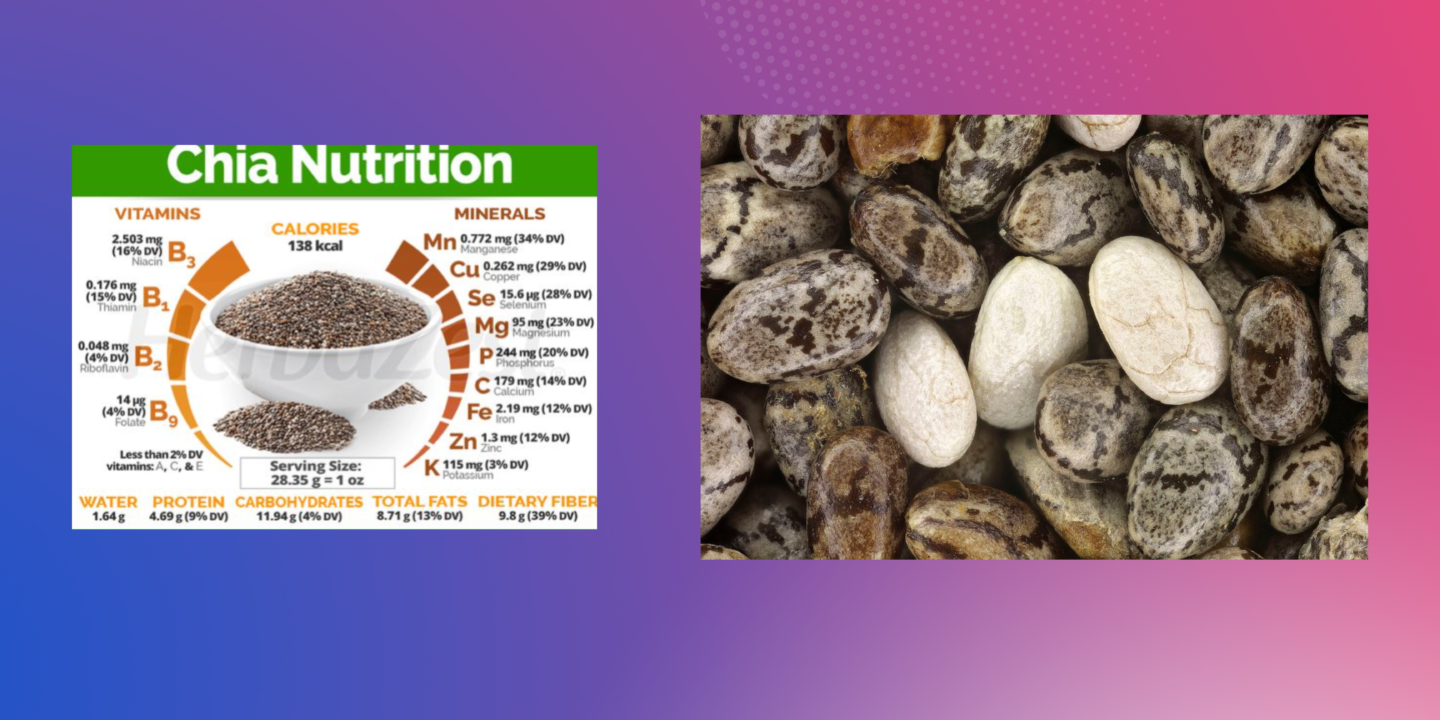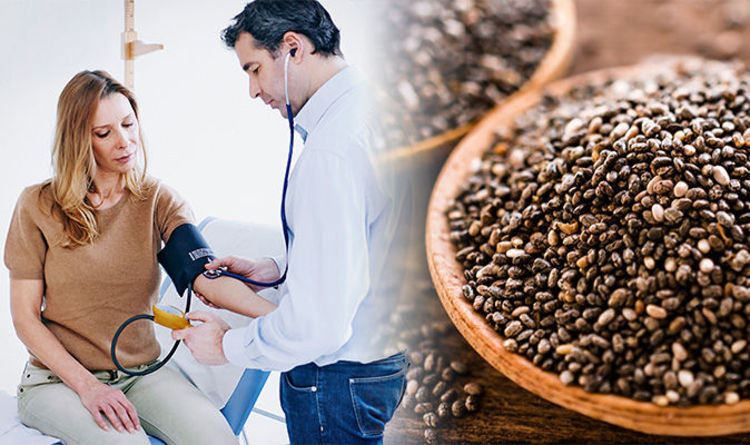

What is Chai Seed
Chia seeds are the edible seeds of Salvia hispanica, a flowering plant native to central and southern Mexico that belongs to the mint family, or of Salvia columbariae, a closely related plant that is native to both the southwest of the United States and Mexico. Chia seeds are 2 millimeters in diameter, oval-shaped, and gray with black and white markings.
- The tiny, dark seeds of the chia plant are known as chia seeds .
- They are indigenous to Mexico and Guatemala, and the ancient Aztecs and Mayans ate them frequently. In actuality, the Mayan word for “strong” is “chia” (1).
- Chia seeds are rich in fiber, omega-3 fatty acids, high-quality protein, as well as a number of necessary minerals and antioxidants.
- They might lower blood levels of heart-healthy omega-3 fatty acids, risk factors for diabetes and heart disease, and intestinal health.
- Chia seeds have an oval form, are tiny, flat, shiny, and smooth in texture. White, brown, or black are some of their color options (2).
- These seeds have a wide range of uses. In addition to being used in baked items, they can be soaked and added to porridge, turned into pudding, or simply sprinkled on top of yogurt or salads.
- They can also be used as an egg substitute or to thicken sauces due to their capacity to absorb liquid and create a gel.
Chia Seeds Nutrition Facts

They might lessen diabetes and heart disease risk factors, blood levels of heart-healthy omega-3 fatty acids, and intestinal wellness.
Each ounce of chia seeds has 138 calories (28 grams).
They include 6% water, 46% carbs (83% of which are fiber), 34% fat, and 19% protein by weight.
3.5 ounces (100 grams) of chia seeds contain the following nutrients (5 Trusted Source):
- 486 calories
- Water: 6%
- 16.5 grams of protein
- 42.1 grams of carbs
- 0 grams sugar
- 34.4 grams of fiber
- 30.7 grams of fat
- 3.33 grams of saturation
- 2.31 grams of monounsaturated fat
- Phospholipids: 23.67 grams
- 17.83 grams of omega-3
- 5.84 grams of omega-6
- Added: 0.14 grams
- It is noteworthy that chia seeds are
Carbs and fiber
- Chia seeds contain more than 80% of their total carbohydrates as fiber.
- Chia seeds contain 11 grams of fiber per ounce (28 grams), which is a sizeable component of the Reference Daily Intake (RDI) for men and women, which is 25 and 38 grams per day, respectively (6Trusted Source).
- Both soluble and insoluble fiber can be found in chia seeds. (7 Reliable Source).
- Short-chain fatty acids (SCFAs) are produced when chia fiber is fermented in the body, which enhances colon health.
Fat
- The abundance of omega-3 fatty acids in chia seeds is one of its distinctive qualities.
- Chia seeds contain around 75% omega-3 alpha-linolenic acid (ALA) lipids, while only about 20% are omega-6 fatty acids (9, 10, 11).
- Chia seeds are really much more effective than flaxseed as the most well-known plant-based source of omega-3 fatty acids (12, 13Trusted Source).
- Some researchers think that consuming more omega-3s than omega-6s lowers inflammation in the body (14Trusted Source).
- Chia seeds encourage a reduced omega-6 to omega-3 ratio since they are an excellent source of omega-3 fatty acids.
- A low ratio is linked to a lower risk of several chronic diseases, including heart disease, cancer, and inflammatory diseases, as well as a lower risk of dying young (15Trusted Source, 16Trusted Source).
- Chia seeds do contain omega-3 fatty acids, but they are not nearly as strong as those found in fish or fish oil, gram for gram (EPA and DHA).
- Before your body can utilize the ALA present in chia, it must be changed into the active forms (EPA and DHA), however this transformation is frequently ineffective.
Protein
- Chia seeds have 19% protein, which is comparable to other seeds but higher than the majority of cereals and grains (1, 10, 22, 23).
- Increased fullness after meals and decreased food consumption are linked to high protein intake (24Trusted Source, 25Trusted Source).
- Notably, these seeds are a premium source of plant-based protein because they contain all nine essential amino acids. However, it is not advised that children eat them as their only source of protein.
Vitamins and minerals
High levels of numerous minerals are present in chia seeds, although they are a poor source of vitamins.
The minerals that are most common are:
- Manganese. Manganese, a mineral that is vital for metabolism, growth, and development, is abundant in whole grains and seeds (28Trusted Source).
- Phosphorus. Phosphorus, which is typically present in diets high in protein, helps to maintain healthy bones and other body tissues (29Trusted Source).
- Copper. Copper, a mineral that is frequently missing in the contemporary diet, is crucial for heart health (30Trusted Source).
- Selenium. Selenium, a crucial antioxidant, is utilized by the body in a variety of functions (31Trusted Source).
- Iron. Iron is essential for the red blood cells’ hemoglobin, which carries oxygen throughout the body. Due to the phytic acid in chia seeds, it might not be well absorbed.
- Magnesium. Magnesium, which is frequently low in the Western diet, is crucial for numerous biological functions (32Trusted Source).
- Calcium. Calcium, the most prevalent mineral in the body, is crucial for healthy bones, muscles, and neurons (33Trusted Source).
- Due to chia seeds’ high phytic acid concentration, several minerals, such iron and zinc, may be less readily absorbed.
Other plant compounds
Several healthy plant components, such as (9, 11, 34Reliable Source), are found in chia seeds.
- Chromogenic acid This antioxidant could reduce blood pressure (35Trusted Source, 36Trusted Source).
- coffee bean acid. This element, which is prevalent in many plant-based meals, may assist in reducing inflammation in the body (37Trusted Source).
- Quercetin. Your chances of developing heart disease, osteoporosis, and several types of cancer may be decreased by this potent antioxidant (38Trusted Source, 39Trusted Source, 40Trusted Source).
- Kaempferol. This antioxidant is linked to a lower risk of cancer and other chronic illnesses (41Trusted Source, 42Trusted Source).
Chia seeds that are well dried and clean last longer because their antioxidants guard the fats from oxidation (1, 43).









Health benefits of chia seeds
The excellent nutritional value and purported health benefits of chia seeds have led to their rising popularity in recent years.
Below are a few of their key health advantages.
Increased blood levels of omega-3

- Chia seeds are a great source of the omega-3 ALA, which is crucial for the health of your body and brain.
- However, before ALA can be utilized by your body, it must be transformed into the active forms, such as EPA.
- Chia seeds have been demonstrated in studies to increase blood levels of ALA and EPA by up to 138% and 39%, respectively, in both people and animals (21Trusted Source, 44Trusted Source, 45Trusted Source, 46Trusted Source, 47Trusted Source).
Improved blood sugar control

For optimum health, blood sugar levels must be within normal ranges.
Chia seeds have been shown in animal tests to lower insulin resistance and enhance blood sugar regulation, two significant risk factors for metabolic syndrome, type 2 diabetes, and heart disease
Human studies reveal that chia seed bread has a more subdued blood sugar effect than more conventional loaves.
Lower blood pressure

Chia seeds may be small, but they are a superfood that can help you prevent heart disease, lower blood pressure, boost energy, and aid in weight loss. Chia seeds have a high content of healthy fats, are a fantastic source of protein and potassium, and have antioxidant properties.
.According to a University of Toronto study that was published in the journal Diabetes Care, adding chia seeds to a group of type 2 diabetics’ diets for three months resulted in lower blood pressure and a significant decrease in some inflammation markers that are linked to an increased risk of heart disease.
Increased fiber intake

The majority of individuals don’t get enough fiber
A high-fiber diet is associated with better gut health and a reduced risk of several illnesses
Chia seeds contain 9.75 grams of fiber per ounce (28 grams), which is 25% and 39% of the Recommended Daily Intake for men and women, respectively
Chia seeds have a remarkable capacity to absorb water, which increases the amount of food in your digestive tract, causing you to feel fuller for longer and consume less food.
Why consume fiber?
Fiber does much more than just support normal bowel movements. Dietary fibers are carbohydrates that can withstand the action of human digestive enzymes, allowing them to pass undigested from the stomach and small intestine and into the large intestine. In other words, they are low in calories, have little effect on blood sugar, aid to extend the feeling of fullness, and even improve gut health.
Fiber can aid in preserving a healthy body weight by prolonging the sense of fullness. Fibre also aids in controlling blood sugar, insulin, and cholesterol levels. The risk of contracting diseases like diabetes and cardiovascular disease can then be managed and decreased as a result. New research suggests that some fibers can also support the immune system’s optimal operation.
Adverse effects and individual concerns
Few to no negative effects have been documented from eating chia seeds, which are usually thought to be safe
Drink plenty of water when eating them, especially if they haven’t been presoaked, to prevent any potential digestive side effects.
Few to no negative effects have been documented from eating chia seeds, which are usually thought to be safe
Drink plenty of water when eating them, especially if they haven’t been presoaked, to prevent any potential digestive side effects.
Phytic acid content

Chia seeds contain phytic acid, just like all seeds do.
A plant substance called phytic acid binds to minerals like iron and zinc to prevent their absorption from diet.
Blood-thinning effect
Omega-3 fats, such as those found in fish oils, may have blood-thinning effects when consumed in high doses
Before including a lot of chia seeds in your diet if you use blood-thinning medication, talk to your doctor. Your medication’s effectiveness may be impacted by omega-3 fatty acids
More Nine health benefits of chia seeds
You simply don’t see many other substances that can do what this seed does, according to Dr. Vuksan, Associate Director of St. Michael’s Hospital in Toronto’s Clinical Nutrition and Risk Factor Modification Centre. Your health will be improved if you add them to any food, even unhealthy ones. Here are nine advantages of chia seeds for your health:
- Its soluble fiber reduces belly fat and cholesterol, hence lowering the risk of heart disease.
- It has a ratio of omega 3 to omega 6 fatty acids that aids in regulating cholesterol.
- Chia seeds are excellent for growing muscle since they are high in protein, which is something that becomes more crucial as we age.
- The soluble fiber in chia can control blood sugar levels and lessen cravings for sugar and high glycemic carbohydrates.
- Chia seeds’ beneficial lipids and fiber steadily release energy, giving you constant vigor as opposed to ups and downs.
- Chia can hold 10 times its weight in water, which helps to hydrate you by allowing liquids to stay in your body for longer.
- Because eating chia seeds makes you feel full, you can eat less and lose weight without getting hungry.
- Chia seeds’ insoluble fiber aids in bulking up feces and cleansing the digestive system.
- As a prebiotic, the soluble fiber in chia seeds nourishes healthy bacteria, enabling them to eliminate harmful infections in your body.
The body may more easily absorb fat-soluble vitamins such vitamins A, D, E, and K with the help of these seeds. Among them are important minerals including calcium, magnesium, iron, and zinc.




